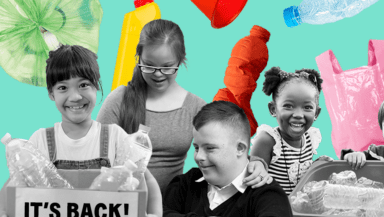Governments across the UK, are looking at introducing new ‘Deposit Return Systems’ for drinks containers (big shout out to Scotland for getting there first!). This would mean a small deposit was paid when purchasing a bottle or can, and that the deposit would be refunded in full when the bottle or can was brought back to be recycled. It’s a relatively simple, common sense way to make sure precious materials like plastic, aluminium and glass don’t end up ‘lost’ and discarded in bins, or littered. Around the world, where they have been brought in, Deposit Return Schemes result in over 95% of bottles and cans being recollected after use.
So far, so common sense.
However there are some arguments that we should limit any potential scheme, and one of those is that it should exclude drinks in glass bottles. We think excluding glass in the initial design of a deposit return scheme is nonsense – and here are seven simple reasons why.
Pain in the glass
No one likes broken glass, either on streets and pavements, in the countryside, on beaches or in rivers. Yet we’ve all seen it. It’s hazardous to people, pets and wildlife. Surely any system that makes ‘throwing away’ glass bottles cost makes sense – and will encourage people to be more responsible.
Retrofitting issues
Reverse Vending Machines which accept used drink containers need to be designed and rolled out to make any deposit return scheme work. Including glass would need to have differently designed machines to separate the materials – which in practice means it’d be very complicated and costly to ‘add in’ glass at a later date (which is what some industry players are arguing we could or should do). It needs to be in it from the outset so that we don’t have to totally change the system later on.
Refill potential
More than just recycling material, we need to start thinking about using less material, and changing the way we use materials. Reusing glass bottles used to be commonplace in the UK for milk and lemonade, and around the world ‘refill’ systems are an integral part of deposit schemes. To have any chance of having refill and reuse as part of our system in the future – we need glass to be in it!
Upper class glass
Some premium drinks, soft and alcoholic, are presented in glass bottles, whilst most at the cheaper end of the scale are in plastic or aluminium. By excluding glass from a deposit system, we might inadvertently be excluding high end drinks as if they are not ‘the problem’. The entire sector needs to be in it to make this work.
Carbon costs
Glass isn’t cheap or easy to make or transport, and it’s also currently not massively profitable to recycle either. It’s also heavy. That means carbon wise – it’s costly. Including glass in a deposit return system helps to avoid glass being wasted, or seen as an alternative to plastic or aluminium – both of which are good news for the planet!
Shifting the problem
If glass isn’t included, then it would potentially lead to some manufacturers switching *to* glass to get around the system. That would increase issues of littering, costs and carbon and make a mockery of the whole thing to boot.
Better recycling
Recycling across the UK varies. Mixed recycling often includes glass, in other places glass is returned separately to bottle banks. In either scenario this presents problems of mess, broken glass, and contaminated recycling – it simply isn’t efficient. A deposit return system for glass would lead to better collection, and better quality recycling of glass (as it would with plastic).



